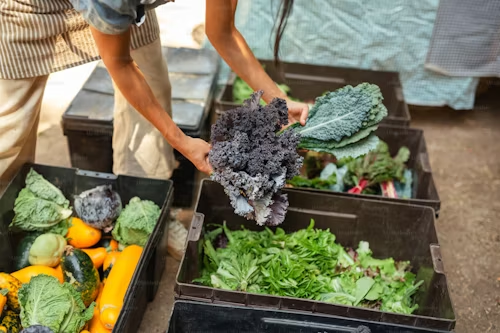The Ultimate Guide to Shopping at a Farmers Market

Farmers markets offer a unique shopping experience where you can find the freshest seasonal produce, artisanal goods, and a direct connection with local farmers and vendors. Unlike grocery stores, these markets provide an opportunity to explore diverse, high-quality food options while supporting small businesses and sustainable agriculture. Whether you are a seasoned market-goer or a first-time visitor, this guide will help you make the most of your shopping experience.
1. Why Shop at a Farmers Market?
Farmers markets have many advantages over traditional retail stores, including:
- Fresh, Seasonal Produce: Fruits and vegetables are harvested at peak ripeness, offering superior flavor and nutrition.
- Supporting Local Farmers: Buying directly from farmers keeps money within the community and helps small farms thrive.
- Organic and Sustainable Options: Many farmers use eco-friendly and pesticide-free growing practices.
- Unique and Artisanal Finds: Handmade cheeses, fresh-baked bread, and handcrafted goods are commonly found.
- Educational Experience: Engaging with vendors helps you learn more about where your food comes from.
2. Preparing for Your Farmers Market Visit
Proper preparation ensures a smooth and enjoyable shopping trip.
- Bring Cash and Reusable Bags: While some vendors accept cards, cash is often preferred for small transactions.
- Arrive Early for the Best Selection: Popular items sell out quickly, especially organic produce and specialty products.
- Check the Market Layout: Familiarize yourself with vendor locations to streamline your shopping.
- Plan Your Meals: Shopping with a rough meal plan in mind helps you buy only what you need.
3. How to Find the Best Deals and Freshest Produce
Being strategic with your shopping approach can help you get more value for your money.
- Compare Prices: Walk around and check different vendors before making a purchase.
- Buy in Bulk: Many vendors offer discounts on bulk purchases of fruits, vegetables, or grains.
- Shop Near Closing Time: Vendors often lower prices toward the end of the market to sell remaining inventory.
- Look for “Seconds”: Some vendors sell slightly imperfect produce at a lower price.
4. Case Studies: Farmers Market Success Stories
Many individuals and businesses have found incredible benefits from shopping and selling at farmers markets.
Case Study 1: Sabohua worked with a local organic farm to expand their reach, increasing sales by 50% in one season.
Case Study 2: A small-batch coffee roaster gained loyal customers by selling their ethically sourced beans at farmers markets.
Case Study 3: A family-run dairy business introduced artisan cheese at their market stall, leading to wholesale distribution deals.
5. Farmers Market Etiquette
Following good market etiquette ensures a pleasant experience for both shoppers and vendors.
- Be Polite to Vendors: Ask questions but be mindful of busy periods.
- Respect Sampling Policies: Only take free samples if you are genuinely considering a purchase.
- Don’t Block Walkways: Be mindful of foot traffic and avoid lingering in front of vendor tables.
- Follow Market Rules: Some markets have restrictions on pets, strollers, or large carts.
6. Maximizing Your Farmers Market Experience
Beyond just shopping, farmers markets offer a variety of experiences that can enhance your visit.
- Attend Cooking Demonstrations: Learn how to prepare seasonal ingredients from local chefs.
- Engage with the Community: Farmers markets are great places to meet people who share your interest in fresh, local food.
- Try Something New: Many markets offer exotic produce or specialty products you won’t find in grocery stores.
7. Final Thoughts
Shopping at a farmers market is a rewarding way to enjoy high-quality food, discover unique products, and support small businesses. By following these tips and strategies, you can make the most of your visit and enjoy a fresher, healthier way to shop.
Find your nearest farmers market and start exploring today with Sabohua.



